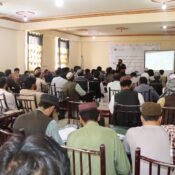
what materials and how to recycle them?
At the first stage, we shall separate decomposable materials from food materials and put them in separate bags, and hand them over to the municipality staff. These materials are converted to composite materials through a code and are used to improve soil and compensate for the wasted food materials.
In the next stage, the recycled materials shall be separated, glasses, papers, plastics, and metals are the best recyclable materials.
Below some benefits of recycling has briefly been mentioned:
- Recycled materials, prevention of wasting national investment
- Energy protected from recycled aluminum can, will keep a television running for three hours.
- We can melt aluminum several times and produce a new dish
- Recycling papers: economical resource, lack of dependency in importing materials for paper, reduced pollution and prevention of cutting trees, and reduced levels of garbage.
- Energy required for a kilo of new plastic is sufficient to produce new three kilos plastic from recycled plastic
- With the help of recycling papers, we avoid cutting more trees.
- Recycling one ton of paper can provide employment opportunities to five people.
- With the help of recycling, fewer areas and pasture land will turn to garbage sites.
- With the help of recycling the need for energy reduces to ¼ and the need for water to 1/100.
- Being a model in spending and sound recycling, are the two basic fundamentals of reducing the environmental pollution.
- Reducing the use of basic materials and energy also plays an important role in reducing environmental pollution and are the benefits of recycling.
- With reduced use of natural resources and recycling, we will increase the life of humans on the earth.
- We shall avoid using nylon and plastic bags because they do not decompose.
- Recycling is a vital step towards the protection of natural resources and the environment.
- Recycling is a green step towards sustainable development
- Lack of paper in developing countries is one of the biggest problems to continue education, with the help of recycling, we will be able to help reduce this problem.
1. Paper recycling
In order to produce one ton of paper, one has to cut 17 trees. If every one of us collects the garbage paper for a year, it will be 5.1 one trees and if all of us do so we will protect 100 million trees a year.
In order to prepare tissue paper for each family, we need to cut 1.5 trees each year.
Using recycled paper instead of preparing papers from trees, reduces air pollution by 74 percent, water pollution by 35 percent, and a 58 percent reduction in the use of water, that is why 50 percent of produced papers in developed countries is recycled.
Therefore, recycling papers in addition to economic benefits, also reduces dependency on the import of raw materials for papers, reduces environmental pollution, prevention of cutting trees, and helps collect and bury garbage.
- Plastic recycling
- Plastics are produced from fuel which is a non-renewable source, but due to lack of decomposition, plastic is considered a sustainable environmental pollutant.
- Nylon and plastic bags remain in nature for an average of 500 to 700 years.
- 30 percent of produced plastic bags are used in sorting. In order to reduce the volume of garbage, we can reduce the amount of sorting.
- Reuse of the bags at the time of purchasing is an effective approach of reducing garbage.
- In order to reduce the volume of garbage, we can use dry and unpolluted plastic bags several times and at the end we can use them to collect garbage.
- Having personal cups instead of using disposable cups and using washable dishes in parties and invitations instead of disposable will reduce the entry of plastic into the environment.
3. Glass recycling
- A glass bottle that is thrown will remain 1000 years more as garbage on the earth.
- In order to produce glass, there is a need to extract a huge amount of crash from the earth which needs a lot of energy and water.
- Energy required to produce a kilogram of glass is 4200-kilo calories.
- Producing glass from recycled glass reduces water contamination by 50 percent and air pollution by 20 percent compared to producing it from new materials.
- Melting a ton of glass, saves 100 tons of fuel.
- Separating broken glasses at home is a huge step in recycling glass.
- During collecting glass, it is better to separate glass bottles in plastic and metal covers based on their colors.
Dangerous garbage
Some of the garbage produced at home are considered to be highly dangerous such as various batteries, solar bulbs, electric items, and others which could endanger and threaten our safety and the environment.
Thus far:
- It is better to avoid using battery items at home. Automatic watches are better than ones with batteries.
We shall avoid putting the solar bulbs or other fuel-burning lights away from fragile areas.
All Categories
Recent Posts
+93764486009
infor@cecop-af.net




